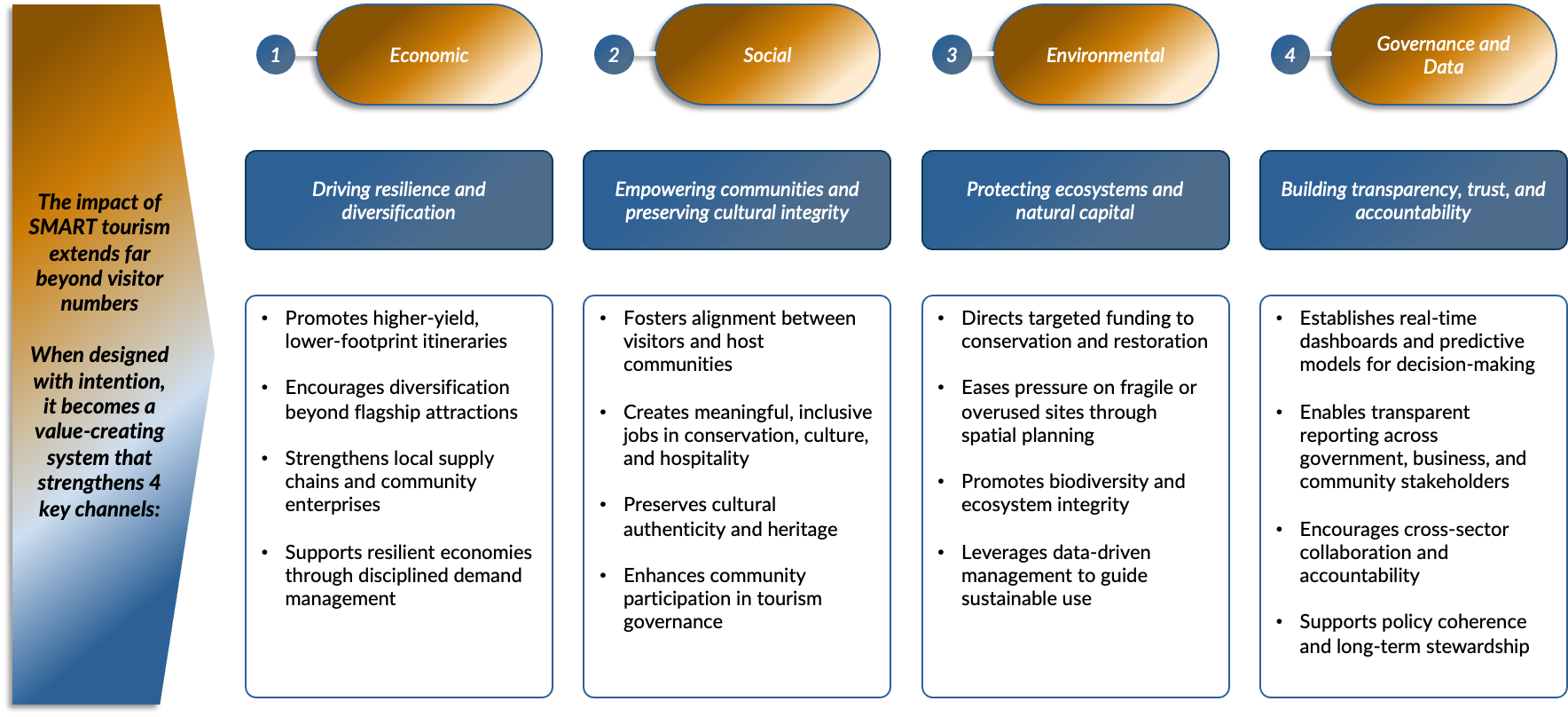Africa stands at a pivotal moment in global travel. As mobility accelerates and destinations compete for high-value visitors, the continent has a rare opportunity to shape a distinct model of tourism growth - one that prioritises long-term value, resilience, and shared benefit. It is no longer just about attracting more arrivals but about ensuring that tourism meaningfully contributes to local communities, supports ecosystems, preserves and promotes heritage and culture of a destination, and delivers quality experiences that stand the test of time.
This opportunity also comes with a responsibility to avoid the patterns playing out in many parts of the world. The rise of overtourism, defined by the UN World Tourism Organisation as the impact of tourism on a destination that excessively influences the quality of life of residents or the visitor experience in a negative way, has become one of the defining challenges of the global travel sector, an urgent reminder of what happens when growth outpaces stewardship.
Overtourism in Perspective
Venice’s historic core is home to around 50,000 residents, yet the city welcomes many millions of visitors annually. That combination of small resident base and heavy visitor flow is often cited as one of the more extreme examples of overtourism in the world. Despite entry fees and cruise ship restrictions, its infrastructure is under constant strain, and local life has become increasingly difficult to sustain. Barcelona faces similar challenges, with protests over housing costs, overcrowding, and a sense of cultural loss. Even wilderness areas are feeling the impact.
Similar trends have been emerging on the African continent. In the Serengeti-Maasai Mara ecosystem, up to 600 safari vehicles may converge at a single river crossing during peak migration - disrupting wildlife and diminishing the visitor experience. In Zanzibar, international arrivals exceeded 700,000 in 2024, contributing close to 30% of GDP, but also intensifying pressure on reefs, freshwater, and community lands. Similarly in Marrakech, visitor densities in the Medina far exceed resident levels during peak months, raising sustainability questions. In Cape Town, seasonal surges to iconic destinations like Table Mountain and the V&A Waterfront underscore the risks of uneven visitor flows.
Although one could argue that overtourism on the continent has not yet reached the levels seen elsewhere, the current dynamic presents an interesting dichotomy. While Africa can certainly expand its share of the international travel market, destinations that have recently risen in prominence, signal the possibility that demand may soon outpace the capacity to host visitors. This could be a symptom of a lack of destination optionality, accessibility and product diversification. To this end, African countries have the opportunity to lead a new chapter in global tourism, grounded in smarter design and deeper value.
Smart Tourism as a Value-Creating Engine
Smart tourism is the foundation for a value-creating engine. It enables destinations to grow intentionally using data, planning, and collaboration to strengthen the very assets that make them thrive. When designed well, it elevates the quality of life for residents, protects natural and cultural heritage, and delivers travel experiences that are meaningful, not extractive.
Its value is visible across four key channels. Economically, smart tourism promotes higher-yield, lower-footprint itineraries, encourages diversification beyond flagship attractions, and supports resilient local economies through disciplined demand management. Socially, it fosters alignment between visitors and host communities, creates meaningful jobs—especially in conservation and hospitality—and preserves cultural authenticity. Environmentally, it directs targeted funding to conservation, eases pressure on fragile sites, and supports biodiversity through data-driven stewardship. Governance and data provide the backbone: real-time dashboards, predictive models, and transparent reporting build the trust and accountability needed across governments, businesses, and communities.

Around the world, destinations are beginning to embrace this shift. Rwanda’s gorilla trekking model tightly controls visitor numbers while directing 10% of permit revenue into local communities - strengthening both conservation and livelihoods. Countries like Norway and New Zealand are using predictive analytics and real-time data to regulate access to nature sites, helping preserve the very landscapes that attract visitors.
In Venice, the 2024 daily visitor fees, aimed at dissuading day visitors, generated over €2 million in revenue. However, reported tourist arrivals have actually increased despite this measure. While local authorities view the outcome positively; arguing that the funds will support destination upkeep and infrastructure maintenance; the city’s resident population continues to decline as tourist flats replace homes.
Barcelona’s interventions are relatively recent, but similar to Venice, tourist taxes have not deterred visitors; instead, they have raised funds that support city maintenance and cultural initiatives. The city’s main challenge is making Barcelona liveable again for its residents. New policies aim to free up 10 000 apartments by revoking all licensed tourist flats by 2028. Critics, however, warn that without complementary policies encouraging new housing development and rent controls, this initiative may ultimately prove ineffective in reducing overtourism. To this end, Cape Town’s surge to over 25,000 Airbnb listings places it among the more prominent short-term rental markets globally, raising concerns about the impact on the city’s local population. Venice and Barcelona serve as cautionary tales - underscoring the importance of acting early, before reactive crisis management becomes the only option.
SMART Tourism in Action: Tourism Corridors on the Continent
Africa doesn’t need to follow existing models - it can build a better one. One promising is the idea of Tourism Corridors: multi-country, thematic routes that connect high-potential sites through shared planning, marketing, and stewardship.
Tourism corridors can connect ecosystems, economies, and communities. By encouraging longer stays, spreading visitor flows more evenly, and elevating under-visited regions alongside iconic ones, they create a more inclusive and balanced tourism experience. At the same time, coordinated planning across borders unlocks shared investment in infrastructure, conservation, and quality standards. When governments, operators, and communities align around a common vision, the result is a more seamless journey for travellers—and greater shared value for those who host them.
Picture a traveller landing in Nairobi, exploring community-run conservancies in the Rift Valley, experiencing Swahili coastal heritage in Tanga, and continuing south into Tanzania’s national parks—all through a curated corridor that balances visitor experience with ecosystem protection.
Way Forward
To make this vision real, governments and partners will need to invest in reliable data systems, cross-border cooperation, and inclusive governance models. Local communities must be involved from the outset, with benefits shared transparently. Policies on visas, transit, and taxation should be aligned to support mobility within corridors. Pilot projects can help test and refine models before scaling.
Africa is reaching a decision point. One path leads to unmanaged growth, i.e. crowded parks, strained infrastructure, and communities left behind. The other leads to a tourism model designed with intention, where value is shared, nature is protected, and local voices shape the future. This is more than a policy shift - it’s a mindset change: toward stewardship over scale, design over default, and long-term impact over short-term gain. As other regions scramble to correct the damage of overtourism, Africa can lead with foresight—building a tourism model that others will one day study. Now is the time to act and to set the pace.
Are you ready to embrace a SMART tourism future? Get in touch at Ayodele.M@africaia.com
Oct 2025 Tourism African Tourism Economic Development

Ayodele Morobi

Devi Paulsen
